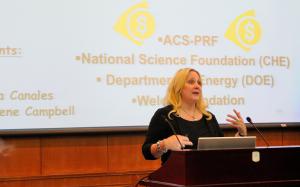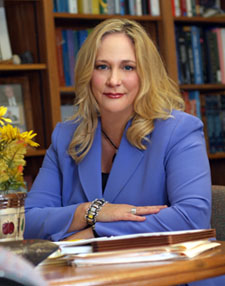Q&A With STEM Advocate and Co-Advisor of the Texas A&M NOBCChE Chapter Kim Renee Dunbar Discusses her Career

The Texas A&M chapter of the National Organization for the Professional Advancement of Black Chemists and Chemical Engineers Chemist was honored by the National Organization for the Professional Advancement of Black Chemists and Chemical Engineers.Kim Renee Dunbar who is co-advisor of the student organization has been a staunch advocate of STEM careers (science, technology, engineering, math) over the years. She and the co-advisor James Batteas of the local NOBCChE chapter received the President’s Award— one of six total that were given in 2013— for their career leadership and advocacy for underrepresented communities in STEM fields. Here is what Kim Renee Dunbar had to say about her legacy.
Where did you grow up and what were your formative early years like?
Kim Renee Dunbar: I was born in Mount Pleasant, Pennsylvania. I attended Sewickley High School and received a B.S. in chemistry with a minor in mathematics. I then went on to pursue my Ph.D. in in inorganic chemistry at Purdue University and also did a postdoctoral stint at Texas A&M University. I started my independent career as an Assistant Professor at Michigan State University. Currently, I am a University Distinguished Professor and the Davidson Professor of Science in the Department of Chemistry at Texas A&M University.
This is not your first award— you’ve received many honors over your lengthy career. What are some of the others?
Kim Renee Dunbar: At Michigan State University, I was awarded a major Freshman Chemistry Teaching Award, a Camille and Henry Dreyfus Teacher-Scholar Award, an Alfred P. Sloan Fellowship and a Sigma Xi Award among others. It was an honor to be so well-received there and an amazing place to start my career. Some of the awards of which I am most proud are two National Science Foundation Creativity Extension Grants, an honorary degree from Westminster College, Graduate Mentoring and Research Awards from the Texas A&M Association of Former Students, and the 2019 Fred Basolo Medal For Outstanding Research in Inorganic Chemistry. I also received the top award for research and service in inorganic chemistry, namely the 2015 ACS Award for Distinguished Service in the Advancement of Inorganic Chemistry, which marked only the second time in the history of the award that a woman was bestowed with this honor. This is a tribute to all my students over the years who have contributed to my success .
You have been a pioneer for women in STEM. Why is it important to you that more women join these fields?
Kim Renee Dunbar: It is a privilege to be recognized along with other preeminent female scientists. In my career, I have had a number of “first woman” titles— first woman in the College of Science to be named a chaired professor at Texas A&M University, for example. I actively encourage women and young girls, who remain underrepresented in science, technology, engineering and math, to consider these fields for careers. I am grateful that I have the opportunity to lead by example. Being involved with the National Organization for the Professional Advancement of Black Chemists and Chemical Engineers is also very gratifying. I have been an advocate for underrepresented groups in chemistry throughout my career and the experience has been very rewarding.
What does your research focus on?
Kim Renee Dunbar: My research covers a diverse range of topics in synthetic and structural inorganic chemistry,and focuses on the use of coordination chemistry principles to establish structure/bonding/properties relationships in molecular materials and in metal-based drugs. I enjoy writing publications with my students and postdoctoral researchers and have authored over 400 publications. I was involved with the American Chemical Society journal Inorganic Chemistry as an Associate Editor for 12 years which exposed me to the process of peer review from the perspective of making decisions about the manuscripts that I sent out for review from my office. I learned a great deal about publishing from this experience and am grateful for the chance to serve my profession in this manner.


